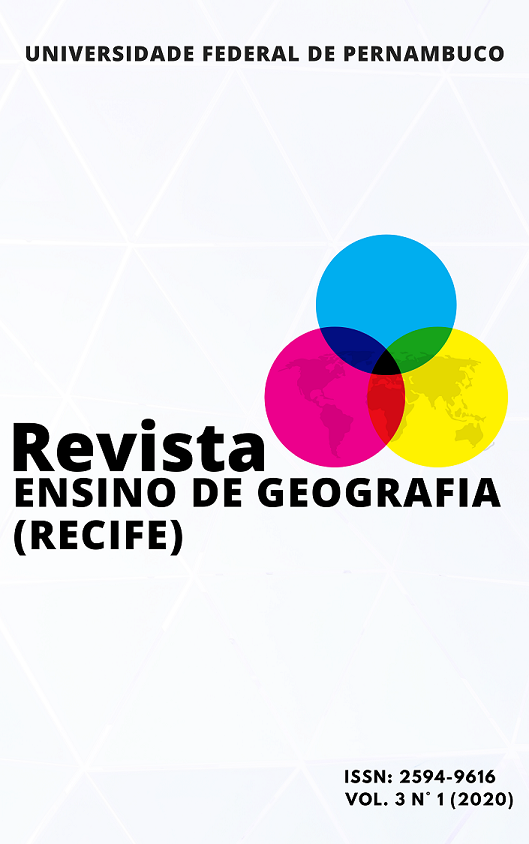Cordel literature: denving the place in school geography
DOI:
https://doi.org/10.51359/2594-9616.2020.241495Keywords:
Location, educational, Cordel Literature and GeographyAbstract
The didactic and pedagogical reflections suggest a change in teaching methodology in schools, based on the concept of breaking with the traditional character that guides existing practices. Therefore we present to analyze the importance of Cordel literature as a tool for reading and understanding the analytical category place in educational Geography. We’ll use the category geographical place from a perspective of representations seeking the readings and constructions of twine perception, meaning and values of the environment. The string must be worked in geography lessons on enhancing lessons while valuing this popular northeastern art. As a result we expect that students are able to grasp the content depicting the Brazilian Northeast, stimulating writing and creativity through the construction of twine , while also encouraging a love of reading , research and particularly the study and understanding of geographical place category. The place, which in this context, then, becomes a representation of multiple manifestations of Geographic Space.
References
ALMEIDA, Maria Geralda.A Produção do Ser e do Lugar Turístico. In: SILVA, José. B.; LIMA, Luiz. C.; ELIAS, Denise. (Org.). Panorama da Geografia Brasileira1. São Paulo: Anna Blume, 2006, p. 109-122.
ANTUNES, Celso (coord.).Geografia e Didática/Simone Selbach (Supervisão geral)-Petrópolis, RJ:Vozes,2010. (Coleção Bem Ensinar).
AZAMBUJA. Leonardo de A. Metodologias cooperativas para ensina e aprender Geografia. In: CALLAI, Helena Copetti (Org). Educação Geográfica: Reflexãoe Prática. IJUÍ/RS: UNIJUI. 2011, p. 185-210.
BRAUN, Ani Maria Swarowsky. Rompendo os muros da sala de aula: O Trabalho de Campo como uma linguagem no ensino de Geografia. Dissertação de Mestrado. Universidade Federal do Rio Grande do Sul. Porto Alegre, Junho de 2005.
BUENO, Thiago da Silva; CALLAI, Helena. AGeografia da vida cotidiana. In: 16º Encontro Nacional de Ensino em Geografia. Porto Alegre, 2009.
CALLAI, H. C. O estudo do Lugar como possibilidade de construção da identidade e pertencimento. Anais do VIII Congresso luso-Afro-Brasileiro de Ciências Sociais. Coimbra, 2004.
CALLAI, Helena Copetti. Aprendendo a ler o mundo: a geografia nos anos iniciais do ensino fundamental.Cad. CEDES,Campinas,v. 25,n. 66,p. 227-247,Aug.2005. Disponível em: http://www.scielo.br/scielo.php?script=sci_arttext&pid=S0101-32622005000200006&lng=en&nrm=iso.Acesso em 08 de Fevereiro de 2020
CASTROGIOVANNI, Antonio Carlos. O LUGAR DA GEOGRAFIA NO ENTRE-LUGAR DO ESPAÇO TURÍSTICO Uma viagem complexa que ainda continua..ROSA DOS VENTOS-Turismo e Hospitalidade, v. 1, 2009.
FERREIRA, Evyllaine Matias Veloso. A literatura de Cordel como recurso didático cultural no ensino de geografia, 2008.
FREIRE, Paulo. Pedagogia do Oprimido. três ed. Rio de Janeiro: Paz e Terra, 1975.
HALL, Stuart. A identidade cultural na pós-modernidade. Tradução Tomaz T. Silva e Guacira L. Louro. 7 ª edição. Rio de Janeiro. 2002. 102p.
KAERCHER, N. (Orgs.)A. Geografia: práticas pedagógicas parao ensino médio. Vol.2. Porto Alegre: Penso, 2011, p.122-144.
KAERCHER, Nestor André. Estudos Sociais: Reflexões, Críticas e Desafios.In: CASTROGIOVANNI, A. Carlos. Geografia em sala de aula: práticas e reflexões. Porto alegre, AGB, 1999.
LOPES, Lucineide Fábia Rodrigues. A Região Nordeste nos livros didáticos de geografia: uma análise histórica / -João Pessoa: [s.n.], 2009.
OLIVEIRA. Livia. O sentido do Lugar. MARANDORA JR. Eduardo, holzerWerther.OLIVEIRA. Livia (Orgs.). Qual o espaço do lugar. São Paulo: Perspectiva, 2012, p. 03-16.
PASSINI, Elza Yasuko. Convite para inventar um novo professor. IN: PASSINI, Elza Yasuko; PASSINI, Romão; MALYSZ, Sandra T. (orgs). Práticas de ensino de geografia e estágio supervisionado. 2ª ed –São Paulo: Contexto, 2011.
PONTUSCHKA, NídiaNacib. PAGANELLE, TomokoIyda. CACETE, NúriaHanglei. Para ensinar e aprender Geografia. 3º ed. São Paulo: Cortez, 2009.
RIBEIRO, Emerson. A criatividade em geografia, prática pedagógica e avaliação: lanternas geográficas.Geosaberes: Revista de Estudos Geoeducacionais, v. 2, n. 4, p. 61-75, 2011.
SCHÄFFER, Neiva O. Ler a paisagem, o mapa, o livro...escrever nas linguagens da geografia. In: NEVES. I.C.B. SOUZA J.V. SHÄFFER N. O. GUEDES P.C. KLÜSENER R. (Orgs.) Ler e escrever: compromisso de todas as áreas. 7ª ed. Porto Alegre: EUFRGS, 2006, 86-103.
SILVA, Jorge Luiz Barcellos. Quais saberes constituem um bom professor de Geografia.O Ensino de Geografia e suas composições curriculares. Porto Alegre: Mediação, p. 215-226, 2014.
SILVA, Paulo Adriano Santos. Território: abordagens e concepções. In: Boletim DATALUTA–São Paulo, Artigo do mês: dezembro de 2015. P. 01 –07. ISSN 2177-4463.
SILVA, Paulo Adriano Santos; GOMES, Robertta de Jesus; MENEZES, Sônia de Souza Mendonça. Novas Proposições Metodológicas para o ensino de Geografia: relatos de experiência no Estágio Supervisionado. In: Geosaberes, Fortaleza, v. 4, n. 8, p.3 -13, jul. / dez. 2013
TUAN, Yi-fu. Espaco e lugar: a perspectiva da experiência. São Paulo: DIFEL, 1983.
TUAN, Yi-Fu. Topofilia; um estudo da percepção, atitudes e valores no meio ambiente. São Paulo: Difel, 1980.
VESENTINI, José William. Para uma crítica na Escola. São Paulo, 1991
VESENTINI, José William. VLACH, Vânia. Geografia Crítica. 4ª ed. São Paulo: Ática, 2009.
Downloads
Published
How to Cite
Issue
Section
License
Copyright (c) 2021 Paulo Adriano Santos Silva, Robertta De Jesus Gomes

This work is licensed under a Creative Commons Attribution 4.0 International License.
Authors who publish with this journal agree to the following terms:- Authors retain copyright and grant the REVISTA ENSINO DE GEOGRAFIA (RECIFE) right of first publication with the work simultaneously licensed under a Creative Commons Attribution NonCommercial International 4.0 (CC BY-NC) that allows others to share the work with an acknowledgement of the work's authorship and initial publication in this journal.
- Authors are able to enter into separate, additional contractual arrangements for the non-exclusive distribution of the journal's published version of the work (e.g., post it to an institutional repository or publish it in a book), with an acknowledgement of its initial publication in this journal.
- Authors are permitted and encouraged to post their work online (e.g., in institutional repositories or on their website) prior to and during the submission process, as it can lead to productive exchanges, as well as earlier and greater citation of published work.



